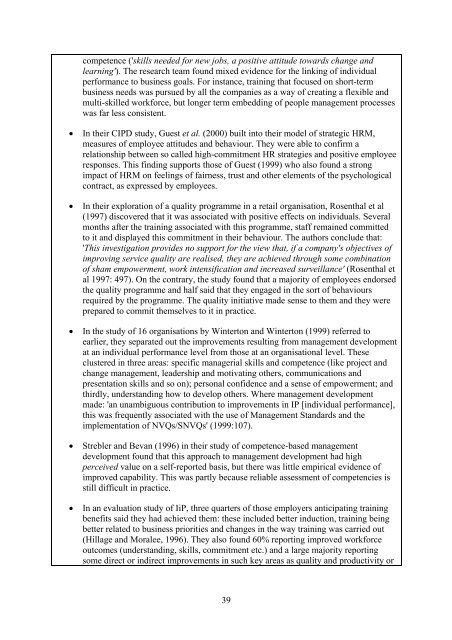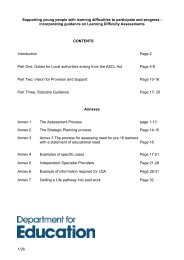The Development of Management and Leadership Capability and its ...
The Development of Management and Leadership Capability and its ...
The Development of Management and Leadership Capability and its ...
Create successful ePaper yourself
Turn your PDF publications into a flip-book with our unique Google optimized e-Paper software.
competence ('skills needed for new jobs, a positive attitude towards change <strong>and</strong><br />
learning'). <strong>The</strong> research team found mixed evidence for the linking <strong>of</strong> individual<br />
performance to business goals. For instance, training that focused on short-term<br />
business needs was pursued by all the companies as a way <strong>of</strong> creating a flexible <strong>and</strong><br />
multi-skilled workforce, but longer term embedding <strong>of</strong> people management processes<br />
was far less consistent.<br />
• In their CIPD study, Guest et al. (2000) built into their model <strong>of</strong> strategic HRM,<br />
measures <strong>of</strong> employee attitudes <strong>and</strong> behaviour. <strong>The</strong>y were able to confirm a<br />
relationship between so called high-commitment HR strategies <strong>and</strong> positive employee<br />
responses. This finding supports those <strong>of</strong> Guest (1999) who also found a strong<br />
impact <strong>of</strong> HRM on feelings <strong>of</strong> fairness, trust <strong>and</strong> other elements <strong>of</strong> the psychological<br />
contract, as expressed by employees.<br />
• In their exploration <strong>of</strong> a quality programme in a retail organisation, Rosenthal et al<br />
(1997) discovered that it was associated with positive effects on individuals. Several<br />
months after the training associated with this programme, staff remained committed<br />
to it <strong>and</strong> displayed this commitment in their behaviour. <strong>The</strong> authors conclude that:<br />
'This investigation provides no support for the view that, if a company's objectives <strong>of</strong><br />
improving service quality are realised, they are achieved through some combination<br />
<strong>of</strong> sham empowerment, work intensification <strong>and</strong> increased surveillance' (Rosenthal et<br />
al 1997: 497). On the contrary, the study found that a majority <strong>of</strong> employees endorsed<br />
the quality programme <strong>and</strong> half said that they engaged in the sort <strong>of</strong> behaviours<br />
required by the programme. <strong>The</strong> quality initiative made sense to them <strong>and</strong> they were<br />
prepared to commit themselves to it in practice.<br />
• In the study <strong>of</strong> 16 organisations by Winterton <strong>and</strong> Winterton (1999) referred to<br />
earlier, they separated out the improvements resulting from management development<br />
at an individual performance level from those at an organisational level. <strong>The</strong>se<br />
clustered in three areas: specific managerial skills <strong>and</strong> competence (like project <strong>and</strong><br />
change management, leadership <strong>and</strong> motivating others, communications <strong>and</strong><br />
presentation skills <strong>and</strong> so on); personal confidence <strong>and</strong> a sense <strong>of</strong> empowerment; <strong>and</strong><br />
thirdly, underst<strong>and</strong>ing how to develop others. Where management development<br />
made: 'an unambiguous contribution to improvements in IP [individual performance],<br />
this was frequently associated with the use <strong>of</strong> <strong>Management</strong> St<strong>and</strong>ards <strong>and</strong> the<br />
implementation <strong>of</strong> NVQs/SNVQs' (1999:107).<br />
• Strebler <strong>and</strong> Bevan (1996) in their study <strong>of</strong> competence-based management<br />
development found that this approach to management development had high<br />
perceived value on a self-reported basis, but there was little empirical evidence <strong>of</strong><br />
improved capability. This was partly because reliable assessment <strong>of</strong> competencies is<br />
still difficult in practice.<br />
• In an evaluation study <strong>of</strong> IiP, three quarters <strong>of</strong> those employers anticipating training<br />
benef<strong>its</strong> said they had achieved them: these included better induction, training being<br />
better related to business priorities <strong>and</strong> changes in the way training was carried out<br />
(Hillage <strong>and</strong> Moralee, 1996). <strong>The</strong>y also found 60% reporting improved workforce<br />
outcomes (underst<strong>and</strong>ing, skills, commitment etc.) <strong>and</strong> a large majority reporting<br />
some direct or indirect improvements in such key areas as quality <strong>and</strong> productivity or<br />
39
















